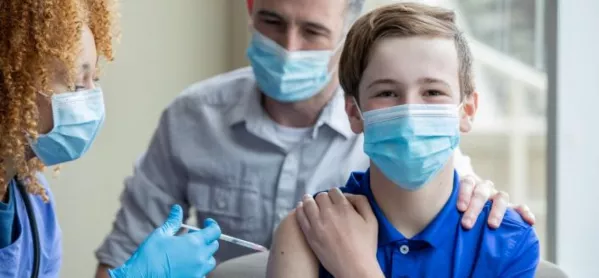Covid: ‘Significantly’ fewer primary pupils to be vaccinated

There has been a significant increase in the proportion of primary school parents who say they are “unlikely” to have their child vaccinated for Covid-19, a new survey has found.
The figures have been published as experts warn the UK is experiencing a “fifth wave” of Covid, as infection rates climb, driven by new variants of Omicron.
The latest data from the School Infection Survey (SIS) shows that the proportion of primary school pupils who were not vaccinated and whose parents said they were “unlikely” to agree to their child being vaccinated in future has risen from 24 per cent in December 2021 to 36 per cent in March 2022.
Meanwhile, nearly all secondary school-age children had Covid-19 antibodies in the most recent set of tests, the study also shows.
It found an estimated 99 per cent of secondary students and 82 per cent of primary pupils tested positive for Covid antibodies between 3 March and 22 March this year.
The survey found that 6 per cent of primary pupils involved had received at least one vaccine against Covid during March 2022.
Researchers also explored parents’ feelings about vaccination. Parents of primary school children who were not vaccinated were asked: “How likely are you to agree to your child having the coronavirus (Covid-19) vaccination if it is offered to them?”
The proportion replying “unlikely” had “significantly increased”, from 23.7 per cent in December 2021 to 35.6 per cent in March of this year, according to the Office for National Statistics (ONS) report.
The main reasons parents gave for not agreeing to their child getting a Covid-19 vaccine were that they did not think their child needed a vaccine (51 per cent) and that they were waiting to see how well it works for children aged between 5 to 11 (51.2 per cent).
- Background: Covid vaccine approved for use for primary school pupils
- Data: School staff more likely to catch Covid than other workers
- Exclusive: Zahawi asks for new guidance on long Covid
Dr Patrick Nguipdop-Djomo, the co-chief investigator of the study, said: “The vaccine sentiment data suggests that the majority of secondary school students who said they were likely to get the vaccine in December did indeed get the vaccine.”
The change among primary school parents, he said, “underlines the importance of a better understanding of the impact of Covid-19 in younger children to help parents in their decisions and provide appropriate public health messaging, including both the safety and benefits of vaccination”.
The report also shows a decrease in the proportion of parents of primary school pupils who said it was very likely that their child would receive the vaccine, from 37 per cent to 32.5 per cent - but a slight increase in the number who said it was fairly likely they would receive it, rising from 24 per cent to 26 per cent between rounds 1 and 3.
In total, 10,109 pupils from 116 primary schools and 52 secondary schools took part in the third round of antibody testing as part of the SIS project, which is jointly led by the London School of Hygiene and Tropical Medicine (LSHTM), Office for National Statistics (ONS) and UK Health Security Agency (UKHSA).
The testing for antibodies, in its final round, found that there were “significantly higher” levels in both primary and secondary students than during the previous round of tests in February, when 97 per cent and 62 per cent of secondary students and primary pupils respectively tested positive for the antibodies.
The study also found that 78 per cent of children aged between four and seven tested positive for antibodies.
Dr Nguipdop-Djomo said: “There has been a small increase in secondary school students testing positive for Covid-19 antibodies, around 99 per cent compared to 97 per cent in the second round of testing in January and February 2022.
“This rise in antibody prevalence was larger in primary school students, increasing from 62 per cent in the last round of testing to 82 per cent in this round.
“It is not surprising that we are seeing this increase in antibody prevalence in primary schools, given it is consistent with the high rates of children infected with the Omicron variant during the spring term.”
You need a Tes subscription to read this article
Subscribe now to read this article and get other subscriber-only content:
- Unlimited access to all Tes magazine content
- Exclusive subscriber-only stories
- Award-winning email newsletters
Already a subscriber? Log in
You need a subscription to read this article
Subscribe now to read this article and get other subscriber-only content, including:
- Unlimited access to all Tes magazine content
- Exclusive subscriber-only stories
- Award-winning email newsletters



